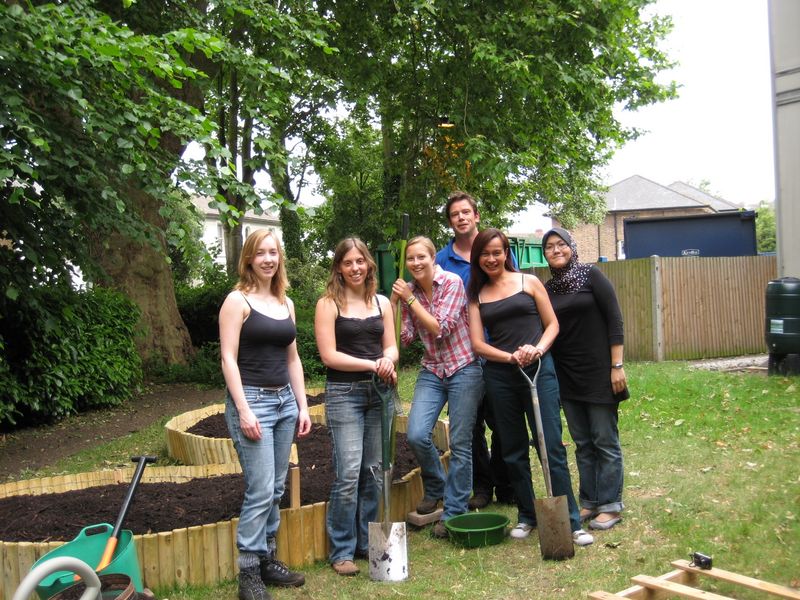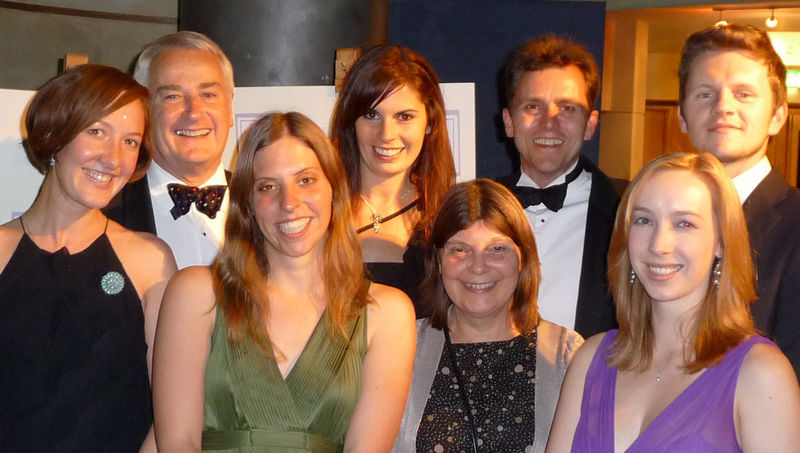Kingston University
Kingston is an expanding, multi-sited, diverse university in a predominantly urban setting. Sustainability at Kingston University (KU) began as disparate grass roots activities but since the formation of a Steering Group for Sustainability (SGS) in 2002, and the appointment of a Sustainability Facilitator in 2006, sustainability work has accelerated across the institution. Work continues under five key activity strands initially identified by the SGS and now coordinated by a Sustainability Hub that sits within the Vice-Chancellors Office.
1. Community and Outreach
Kingston University champions itself as a civic university and has strong links with the local community. An innovative partnership project with Kingston Council, called ‘Positive Environment Kingston’, partners MSc students with local organisations keen to improve their green practices. Student groups perform live environmental audits, as part of the teaching and learning process, and are assessed on their final reports and recommendations.
The award winning KU End of Term Halls Donation scheme realises the potential of quality goods and useable unwanted items. It diverts approximately 5 tonnes from landfill every year and has a local focus, with 79% of all items donated being reused within a 12 mile radius.
A nature trail and outdoor learning garden has been created as a resource for local schools and a website, monthly electronic newsletter and social networking presence ensure information on schemes and events reach staff, students and the wider community.
2. Curriculum
Ensuring Kingston graduates are sustainability-literate is a key objective for the Sustainability Hub. A new suite of interdisciplinary Masters courses are being introduced across the University. The programmes include new modules designed for shared learning across traditional professional and academic disciplines. From September 2010 the Environmental Law and Sustainability programme will join the Sustainability for Built Environment Practice and Sustainability, Environment and Change courses with more to be introduced next year.
‘Real World Learning’ is another tool being used to embed sustainability into the Curriculum, giving students experience in the world of work and increasing their skills base. This includes extending work shadowing and work experience modules, and enabling local community groups and businesses to provide sustainability briefs for student project work.
3. Estates and Facilities
Kingston was the first university to achieve phase 3 of BS8555 in the UK and actively encourages others to work to achieve this environmental standard through a buddy system for phased Environmental Management System implementation. KU successes have been the roll out of an extensive recycling scheme which aims to achieve a 60% recycling rate by the end of 2010; a reduction of 10% in kgCO2 /m2 and 20% in tonnes CO2/£ million turnover on 2005/06 levels for the whole estate; and water efficiency savings of over £80,000 p.a. The university also uses BREEAM for major building and refurbishment projects.
Two community gardens have now been established on university grounds, with a third planned and the recently established Biodiversity Action and Implementation groups are working to ensure that the university campuses provide habitats for local wildlife.
4. Governance
The integration of sustainability across KU has been reflected in University policies. The Environmental Policy has been joined by a Travel Plan and a Sustainable Procurement Policy increasing the amount of recycled items purchased as standard and influencing the food bought and sold by the university. Since 2006 Kingston has been a Fairtrade University.
5. Research and Consultancy
Monthly research seminars occur during term time to disseminate new research within the university and local community and training events are offered regularly to local businesses in order to share best practice. KU researchers are also involved in the Ecology and Sustainability research branch of the Dorich House Group of seven European universities, and have attended workshops held in Germany and Turkey to create new research links.
These achievements and the ongoing work at Kingston University were recognised as Highly Commendable in the 2010 Green Gown awards Continuous Improvement - Institutional Change category. Kingston University also achieved a first class ranking in the 2010 People and Planet Green League.
Main Contact Name: Nicola Corrigan
Main Contact Email & Telephone: [email protected] and 020 85478213
Further information: www.kingston.ac.uk/sustainability
Share with us: www.twitter.com/shkingstonuni www.facebook.com/SHKingstonUni














